The Deeper Thinking Podcast
The Deeper Thinking Podcast The Deeper Thinking Podcast offers a space where philosophy becomes a way of engaging more fully and deliberately with the world. Each episode explores enduring and emerging ideas that deepen how we live, think, and act. We follow the spirit of those who see the pursuit of wisdom as a lifelong project of becoming more human, more awake, and more responsible. We ask how attention, meaning, and agency might be reclaimed in an age that often scatters them. Drawing on insights stretching across centuries, we explore how time, purpose, and thoughtfulness can quietly transform daily existence. The Deeper Thinking Podcast examines psychology, technology, and philosophy as unseen forces shaping how we think, feel, and choose, often beyond our awareness. It creates a space where big questions are lived with—where ideas are not commodities, but companions on the path. Each episode invites you into a slower, deeper way of being. Join us as we move beyond the noise, beyond the surface, and into the depth, into the quiet, and into the possibilities awakened by deeper thinking.
Episodes
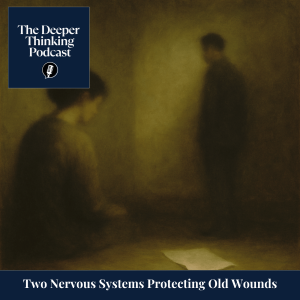
Tuesday May 27, 2025
Tuesday May 27, 2025
Two Nervous Systems Protecting Old Wounds – The Deeper Thinking Podcast
The Deeper Thinking Podcast
A meditation on rupture, habit, and the unseen choreography between two people trying not to break the same way again.
What looks like conflict is often just protection—two nervous systems trying to avoid something they’ve felt before. In this episode, we explore what happens when patterns repeat, when silence holds more weight than speech, and when staying becomes its own kind of risk. With insights drawn from Judith Butler, Stanley Cavell, Luce Irigaray, and Emmanuel Levinas, this essay reflects on embodied response, inherited roles, and the ethics of emotional presence.
This episode doesn’t offer instruction. It lingers with the friction between bodies, beliefs, and expectations. Through nine recursive sections, we stay close to the gestures that interrupt old rhythms: a sentence stopped midway, a breath held differently, a story no longer told the same way. What emerges is not certainty, but continuity. A kind of attention that makes returning possible.
Echoes
Here are some echoes that surfaced along the way:
What we call distance is often just defense.
Trust isn’t repaired. It’s redefined under pressure.
Staying isn’t certainty. It’s practice.
Breakthroughs rarely feel like breakthroughs.
The body often answers before the mind can understand.
We inherit patterns we never chose—but we don’t have to repeat them.
Why Listen?
Witness the emotional physics of repair through narrative recursion
Hear how love unfolds in pauses, patterns, and returns
Feel what happens when a habit breaks and presence takes its place
Let the rhythm of return replace the demand for resolution
Listen On:
YouTube
Spotify
Apple Podcasts
Support This Work
If you’d like to support the ongoing work, you can visit buymeacoffee.com/thedeeperthinkingpodcast or leave a review on Apple Podcasts. Thank you.
Bibliography
Butler, Judith. Giving an Account of Oneself. Fordham University Press, 2005.
Cavell, Stanley. Philosophy the Day After Tomorrow. Harvard University Press, 2005.
Irigaray, Luce. Ethics of Sexual Difference. Cornell University Press, 1993.
Levinas, Emmanuel. Totality and Infinity. Duquesne University Press, 1969.
Bibliography Relevance
Judith Butler: On ethical visibility and the conditions of recognition
Stanley Cavell: On the unfinished nature of intimate conversation
Luce Irigaray: On breath, difference, and holding relational space
Emmanuel Levinas: On the face of the other and the ethics of interruption
Not every wound needs to be healed. Some just need someone to stay with them long enough to change shape.
#RelationalRepair #SomaticPresence #Psychoanalysis #JudithButler #StanleyCavell #LuceIrigaray #Levinas #TheDeeperThinkingPodcast #EmotionalRecursion #TwoNervousSystems #TheOnesWhoStay
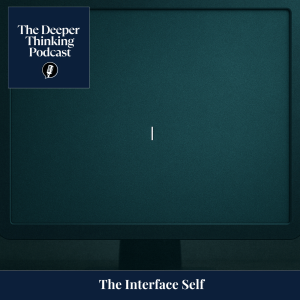
Monday May 26, 2025
Monday May 26, 2025
The Interface Self
The Deeper Thinking Podcast
For those who sense their identity stretching to fit the screen—and want to listen more closely to what remains.
In a world that rewards legibility over complexity, what happens to the parts of us that don’t render cleanly? This episode explores the soft coercion of digital platforms—how identity, emotion, and presence are shaped by visibility logic, and how silence becomes a form of resistance. Drawing from post-structural theory, affect studies, and narrative psychology, we consider what remains when we stop performing and start remembering the self beneath the format.
This is not a critique of social media—it is a meditation on Goffman’s dramaturgical identity, Foucault’s ambient surveillance, and the technological shaping of subjectivity. With gentle reference to Byung-Chul Han, Mark Fisher, Judith Butler, and Donald Winnicott, we explore how presence dissolves under the pressure to narrate, and how attention fatigue becomes an existential condition.
We reflect on the difference between performance and presence, the ethics of ambiguity, and the subtle grief of being understood too quickly. In a space that rarely allows us to pause, we ask what it means to be unrendered, and why that might be the last intact form of resistance.
Reflections
This episode honours the ache beneath the caption. It’s an invitation to feel what remains when the performance ends.
Not all silences are gaps. Some are sanctuaries.
The interface doesn’t demand truth—it rewards repetition.
We’ve learned to narrate before we’ve felt.
The uncaptioned moment may be the most alive.
To be present without performance is an ethical act.
Sometimes, recovery begins by not posting.
The truest parts of the self don’t scale.
Maybe we don’t need to be understood. We need to stay near what can’t be explained.
Refusal can be quiet, soft, and still make room for freedom.
Why Listen?
Rethink identity as something performed through architecture, not essence
Explore the ethics of opacity, slowness, and silence
Engage with Butler, Han, Fisher, and Winnicott on formatting, emotional labor, and soft resistance
Listen On:
YouTube
Spotify
Apple Podcasts
Support This Work
If this episode stayed with you and you’d like to support the ongoing work, you can do so gently here: Buy Me a Coffee. Thank you for being part of this slower conversation.
Bibliography
Han, Byung-Chul. The Transparency Society. Stanford University Press, 2015.
Butler, Judith. Giving an Account of Oneself. Fordham University Press, 2005.
Fisher, Mark. Capitalist Realism. Zero Books, 2009.
Winnicott, Donald. The Maturational Processes and the Facilitating Environment. International Universities Press, 1965.
Bibliography Relevance
Byung-Chul Han: Diagnoses the culture of overexposure and how transparency erodes depth.
Judith Butler: Frames identity as a performative act under social constraint.
Mark Fisher: Illuminates the psychic toll of systems we feel unable to escape.
Donald Winnicott: Recovers the concept of a true self that can only emerge without an audience.
The real self isn’t hidden. It’s just uncaptioned.
#TheInterfaceSelf #JudithButler #ByungChulHan #MarkFisher #Winnicott #AttentionFatigue #Presence #QuietRefusal #TheDeeperThinkingPodcast #Selfhood #PostPerformance #AlgorithmicIdentity #DigitalPhilosophy
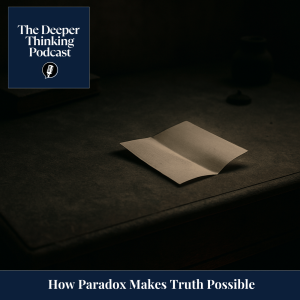
Sunday May 25, 2025
Sunday May 25, 2025
The Paradox That Makes Truth Possible –
The Deeper Thinking Podcast
A meditation on contradiction as condition—not conflict—and the quiet cultural systems that cleanse paradox from our narratives, technologies, and sense of the real.
What if truth doesn’t emerge from coherence, but from contradiction? In this episode, we explore the doctrine of paradox control: the idea that modern institutions, platforms, and psyches are structurally engineered to avoid unresolved complexity. Drawing from Søren Kierkegaard, Simone Weil, Maurice Merleau-Ponty, and Michel Foucault, we examine how paradox is not a problem to be resolved but a structure to be held—an ethical stance in the age of flattening thought.
This is not theory for theory’s sake. It’s a cultural diagnostic for the systems that demand simplicity when reality insists on mess. From AI to memory, faith to storytelling, we question how meaning survives in a world that mistakes polish for insight.
Reflections
Here are some reflections that surfaced along the way:
Paradox isn’t contradiction—it’s structure.
Simplification is not the same as clarity.
Truth resists resolution. It endures tension.
We cleanse culture of contradiction at the cost of depth.
Systems that fear paradox become brittle and over-sure.
Ethics may begin in the refusal to flatten what aches.
Why Listen?
Discover how paradox sustains meaning in a world obsessed with coherence
Learn how complexity is filtered out of platforms, narratives, and selves
Reframe contradiction as a mark of moral and philosophical depth
Engage with thinkers who hold space for what resists simplification
Listen On:
YouTube
Spotify
Apple Podcasts
Support This Work
If you’d like to support the ongoing work, you can visit buymeacoffee.com/thedeeperthinkingpodcast or leave a review on Apple Podcasts. Thank you.
Bibliography
Kierkegaard, Søren. Philosophical Fragments. Princeton University Press, 1985.
Weil, Simone. Gravity and Grace. Routledge, 2002.
Merleau-Ponty, Maurice. The Visible and the Invisible. Northwestern University Press, 1968.
Foucault, Michel. The Archaeology of Knowledge. Pantheon Books, 1972.
Bibliography Relevance
Søren Kierkegaard: Frames paradox as foundational to subjective truth and faith
Simone Weil: Articulates a form of attention that bears rather than resolves
Maurice Merleau-Ponty: Offers a non-linear view of perception as contradiction-laden
Michel Foucault: Shows how institutional systems manage discourse through subtle exclusions
When culture forgets how to hold paradox, it forgets how to hold itself.
#ParadoxControl #PhilosophyOfTruth #Kierkegaard #SimoneWeil #MerleauPonty #Foucault #TheDeeperThinkingPodcast #CulturalComplexity #AIandContradiction #EthicsOfUnresolvedTruth
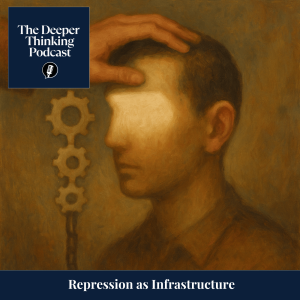
Saturday May 24, 2025
Saturday May 24, 2025
Repression as Infrastructure
The Deeper Thinking Podcast
When everything feels permitted, but nothing quite feels free—repression may no longer be psychological, but infrastructural.
Repression is not hidden; it is designed. Not as an accident of the psyche, but as a feature of the system. If repression once belonged to the inner life—some stubborn knot of childhood or dreamwork—then now it belongs to the infrastructures that route our decisions before we know we’ve made them. It is embedded in how choices are presented, how emotions are monetized, how attention is farmed. This is no longer Freud’s domain of latent desire breaking through the cracks. This is repression as supply chain, as operating system, as user interface.
A supermarket shelf represses more than it offers: it offers you infinite choice between brands while repressing the question of why you need fifty versions of the same cereal. A dating app filters desire into swipeable patterns that mask the infrastructural loneliness that made the app necessary. Governance does not tell you no—it lets you say yes to whatever is already allowed. The contemporary subject is not forbidden; they are permitted into submission.
In this light, freedom becomes a performance of options. Repression becomes what structures those options so that they never touch the root. And in this switch from the unconscious to the infrastructural, repression becomes ambient, ergonomic, and invisible. It is felt not in what is denied, but in what is subtly redirected. You don’t even notice the desire fall away—you only feel that everything is somehow available, and somehow hollow.
Freud imagined repression as a psychic mechanism necessary to civilize instinct. But in a system that profits from instinct—where the raw is the sellable and the intimate is the dataset—repression morphs. It is no longer the silencing of the unacceptable but the engineering of what is acceptable in the first place. And so the civilizing function doesn’t suppress—it guides, gently, into paths pre-structured for behavior, belief, and consumption.
The architecture of repression is now algorithmic. It auto-completes not only your sentence, but your desire. The silence is not in your head—it’s in the system. In what the feed does not show you. In what the platform makes impossible to articulate. This is not repression that causes neurosis. It is repression that produces normativity. It teaches you not to ask.
If repression was once the cost of being social, it is now the substrate of sociality itself. The medium is the repression. The governance is the silence. And in this, we do not suffer from too much constraint. We suffer from the illusion of none.
Why Listen?
Explore how repression has migrated from psyche to interface
Reframe freedom as something subtly structured by design
Understand how governance today operates through ambient permission, not prohibition
Rethink desire in systems that know you too well to let you ask for what you need
Listen On:
YouTube
Spotify
Apple Podcasts
Support This Work
Support ongoing production by visiting buymeacoffee.com/thedeeperthinkingpodcast or leaving a review on your podcast platform of choice. Thank you.
Further Reading
Freud, Sigmund. The Ego and the Id.
Foucault, Michel. Discipline and Punish – systems of soft control and social conditioning
Zuboff, Shoshana. The Age of Surveillance Capitalism – repression by personalization
When control feels like compatibility, the most radical act may be to notice what no longer arrives.
#Repression #InterfaceEthics #DigitalGovernance #Neoliberalism #SystemicDesign #Freud #AlgorithmicSociety #TheDeeperThinkingPodcast #PhilosophyOfControl
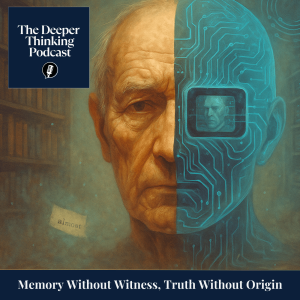
Friday May 23, 2025
Friday May 23, 2025
Memory Without Witness, Truth Without Origin - The Deeper Thinking Podcast
The Deeper Thinking Podcast
A slow meditation on truth without origin, memory without witness, and the subtle loss of metaphor in a world rendered by machines.
What if the future didn’t arrive with force, but with recursion? In this episode, we introduce the theory of Recursive Plausibility: the idea that truth, memory, and presence are increasingly simulated by machines trained on their own outputs. Drawing from the work of Brian Massumi, Lauren Berlant, Avery Gordon, and contemporary epistemology, we explore how AI doesn’t just displace human thought—it inherits a world already withdrawing from its capacity to remember, misread, or remain.
This is not a manifesto or forecast. It’s a conceptual walk through the fading boundaries between simulation and sensation. We reflect on simulation theory, ambient estrangement, and the ethics of unclaimed knowledge—questioning how presence, care, and cognition are altered when AI begins to feel familiar not because it understands us, but because it remembers what we’ve already taught it to forget.
Reflections
Here are some reflections that surfaced along the way:
AI does not generate meaning—it performs coherence.
Truth no longer lands. It loops.
What we call memory may soon refer only to what was rendered.
The most honest metaphor is the one that risks failing.
Presence without weight is the new shape of attention.
The archive is no longer what was stored—it’s what gets simulated most fluently.
Why Listen?
Encounter a new theory of AI epistemology and emotional design
Explore the cultural consequences of simulation-as-memory
Consider how metaphor, misreading, and ritual are slowly untrained
Reflect on presence, cognition, and the strange persistence of machines that continue after we’ve paused
Listen On:
YouTube
Spotify
Apple Podcasts
Support This Work
If you’d like to support the ongoing work, you can visit buymeacoffee.com/thedeeperthinkingpodcast or leave a review on Apple Podcasts. Thank you.
Bibliography
Berlant, Lauren. Cruel Optimism. Duke University Press, 2011.
Massumi, Brian. Parables for the Virtual. Duke University Press, 2002.
Gordon, Avery F. Ghostly Matters. University of Minnesota Press, 1997.
Baudrillard, Jean. Simulacra and Simulation. University of Michigan Press, 1994.
Bibliography Relevance
Lauren Berlant: Introduces the concept of cruel optimism—core to how we perform care without presence
Brian Massumi: Offers a theory of affect that precedes cognition, central to pre-verbal AI response modeling
Avery Gordon: Provides a framework for spectral presence and epistemic haunting
Jean Baudrillard: Early theorist of simulation and symbolic collapse, reframed here in recursive, generative terms
We do not train machines to know us. We train them to remember the shape of forgetting we already perform.
#RecursivePlausibility #AIepistemology #SimulationTheory #LaurenBerlant #BrianMassumi #AveryGordon #Baudrillard #TheDeeperThinkingPodcast #EpistemicDrift #AmbientEstrangement #DigitalPhilosophy
![[ReUpload] The Psychology of Regret: Why We Dwell on Past Mistakes](https://pbcdn1.podbean.com/imglogo/ep-logo/pbblog19459659/1_20250522_174657_0000_300x300.png)
Thursday May 22, 2025
Thursday May 22, 2025
The Psychology of Regret: Memory, Morality, and the Impossibility of Letting Go
The Deeper Thinking Podcast
For those drawn to ethical memory, reflective depth, and the architecture of what-ifs.
What exactly is regret—and why does it linger? This episode rethinks regret not as failure, but as a signal: a moral memory, a call to presence, and a mirror of the lives we almost lived. From the structure of memory to existential ethics, we trace regret as a force that reshapes identity and binds us to the past. With insights from cognitive science, philosophy, and literature, we explore how regret endures, how it distorts, and how it teaches.
Drawing on thinkers like Daniel Kahneman, Bernard Williams, Friedrich Nietzsche, and Henri Bergson, this conversation unfolds across five lenses: cognitive patterns, ethical tension, memory distortion, cultural archetypes, and the question of whether letting go is even possible—or desirable.
Through stories, studies, and paradoxes, we ask: What if regret is not a flaw, but a form of wisdom we haven’t learned how to hold?
Reflections
Here are a few reflections that surfaced in the making of this episode:
Regret is memory refusing to heal—not because we’re broken, but because we’re still listening.
The past is not over. It’s embedded in the way we frame possibility.
To regret is to feel the contour of an unlived path—and to mourn its silence.
Some regrets are burdens. Others are teachers. We confuse the two at our peril.
Regret doesn’t just haunt; it reveals what we value most deeply.
Letting go may not mean forgetting. It may mean learning how to carry differently.
Sometimes, we miss red the past not because we didn’t know better—but because knowing doesn’t always change feeling.
Why Listen?
Explore how cognitive science explains the fixation on "what could have been"
Engage with Jean-Paul Sartre and Bernard Williams on moral responsibility and regret
Reflect on how Henri Bergson reframes time and memory in the presence of loss
Consider whether letting go of regret is liberation—or a form of forgetting too much
Discover how literature and cinema encode regret as a mythic structure of modern life
Listen On:
YouTube
Spotify
Apple Podcasts
Support This Work
If this episode stayed with you and you’d like to support the ongoing work, you can do so gently here: Buy Me a Coffee. Thank you for helping sustain thoughtful, slow media.
Bibliography
Williams, Bernard. Moral Luck.
Sartre, Jean-Paul. Being and Nothingness; Existentialism is a Humanism.
Nietzsche, Friedrich. The Gay Science; Twilight of the Idols.
Bergson, Henri. Creative Evolution.
Kahneman, Daniel. Thinking, Fast and Slow.
Schacter, Daniel. The Seven Sins of Memory.
Seligman, Martin. Learned Optimism.
Neff, Kristin. Self-Compassion.
Proust, Marcel. In Search of Lost Time.
Dostoevsky, Fyodor. Crime and Punishment.
McEwan, Ian. Atonement.
Ishiguro, Kazuo. The Remains of the Day.
Bibliography Relevance
Bernard Williams: Connects moral agency with the weight of hindsight.
Jean-Paul Sartre: Frames regret as a confrontation with freedom and responsibility.
Friedrich Nietzsche: Challenges regret through affirmation and recurrence.
Henri Bergson: Explores how time folds through emotion and memory.
Daniel Kahneman: Illuminates how regret distorts rational assessment.
Kristin Neff: Offers psychological tools for meeting regret with kindness.
Perhaps the hardest part of regret isn’t the pain of what happened—but the silence of what never did.
#PhilosophyOfRegret #BernardWilliams #JeanPaulSartre #FriedrichNietzsche #DanielKahneman #RegretAndMemory #MoralResponsibility #ExistentialEthics #TheDeeperThinkingPodcast #WisdomOfRegret #LettingGo #TimeAndEmotion #NarrativeIdentity
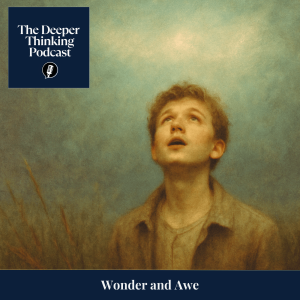
Thursday May 22, 2025
Thursday May 22, 2025
Wonder and Awe: On the Edges of What Cannot Be Held
The Deeper Thinking Podcast
For those drawn to quiet thresholds, unrepeatable presence, and the philosophical weight of silence.
Awe rarely arrives with explanation. It brushes the edge of sense, disrupts the rhythm of thought, and leaves behind no insight—only a shift. In this episode, we explore wonder not as feeling or fact, but as attention. As residue. As refusal. We follow the traces left by formative encounters with what could not be named, and ask what remains when the world no longer fits the words we give it. What does it mean to witness rather than explain? To dwell in what exceeds our grasp, without turning it into knowledge?
This episode is not about wonder. It moves with it. We draw on the philosophies of Simone Weil, Gaston Bachelard, Karen Barad, and the art of Agnes Martin and John Cage to hold open a space for the ineffable: that which remains intact only when we stop trying to hold it.
We ask: What happens when awe is no longer accessible through grandeur? What if its deepest register is not scale, but fracture? What kinds of knowing begin where explanation ends?
Reflections
This episode lingers in the atmosphere of what cannot be named. It does not pursue awe. It waits for it. It follows its residue through quiet disruptions in time, attention, and sense.
Awe is not the event—it is what escapes it.
Wonder is not resolution. It is a refusal to conclude.
To witness is not to see clearly—but to stay with what blurs.
Some truths are not lost. They are untranslatable by design.
Philosophy does not always clarify. Sometimes, it listens.
Why Listen?
Reframe awe as ethical stance rather than emotional state
Explore the cognitive displacement of wonder through explanation
Engage with Barad, Weil, Bachelard, and Cage on perception and presence
Consider how attention itself becomes a philosophical act
Listen On:
YouTube
Spotify
Apple Podcasts
Support This Work
If this episode opened something in you, you can support the continuation of this project here: Buy Me a Coffee. Your presence sustains this slower pace of thought.
Bibliography
Weil, Simone. Gravity and Grace.
Bachelard, Gaston. The Poetics of Space.
Barad, Karen. Meeting the Universe Halfway.
Martin, Agnes. Paintings and Writings.
Cage, John. Silence: Lectures and Writings.
Bibliography Relevance
Simone Weil: Attention as metaphysical openness.
Gaston Bachelard: Space and reverie as epistemic acts.
Karen Barad: Intra-active perception beyond observer/object duality.
Agnes Martin: Minimalism as spiritual attention.
John Cage: Silence as compositional philosophy.
Some encounters are not to be understood. Only felt. And even then—barely.
#WonderAndAwe #Perception #SimoneWeil #GastonBachelard #KarenBarad #AgnesMartin #JohnCage #PhilosophyOfAwe #AttentionAsEthics #TheDeeperThinkingPodcast
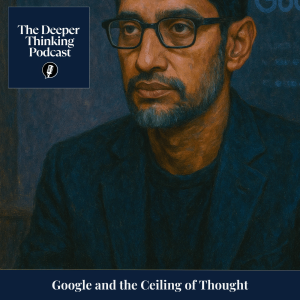
Wednesday May 21, 2025
Wednesday May 21, 2025
Google and the Ceiling of Thought: How Gemini Redraws the Limits of Memory, Agency, and Attention
The Deeper Thinking Podcast
For those interested in ambient intelligence, predictive cognition, and the philosophical cost of fluency.
What happens when an AI finishes your sentence, schedules your tour, or remembers more than you do? In this episode, we reflect on Google’s I/O 2025 keynote and explore how Gemini marks a turning point—not just in artificial intelligence, but in the architecture of selfhood. We examine how memory, authorship, and volition are increasingly shared with systems that listen, anticipate, and act in our name. The assistant is no longer a tool. It is an editor of attention. A curator of cognition.
This is not a review of the keynote. It is a meditation on what is being displaced by fluency. We engage with the ideas of Gilbert Simondon, Karen Barad, Jacques Derrida, Shoshana Zuboff, and Byung-Chul Han to consider what remains unrendered when the assistant becomes the protagonist.
We ask: What becomes of thought when it is predicted before it is felt? What is memory when recall is no longer embodied? And what is authorship when our most fluent voice lives outside of us?
Reflections
This episode lingers where the keynote does not. It traces the implications of synthetic selfhood, ambient intelligence, and the editorial logic that now underwrites attention itself.
The assistant is no longer a reply. It is a rhythm.
When Gemini remembers for you, what happens to forgetting?
Fluency can erase friction. But friction makes thought real.
There are parts of us that cannot be modeled. Let them remain illegible.
The most human gesture may now be: to pause, and say nothing.
Why Listen?
Reframe AI not as tool, but as epistemic infrastructure
Explore how fluency becomes authority—and how prediction replaces permission
Consider the philosophical cost of having your thoughts finished for you
Engage with Simondon, Barad, Derrida, Zuboff, and Han on synthetic memory and digital agency
Listen On:
YouTube
Spotify
Apple Podcasts
Support This Work
If this episode helped you see more clearly, you can support this work here: Buy Me a Coffee. Thank you for being part of this slower conversation.
Bibliography
Simondon, Gilbert. On the Mode of Existence of Technical Objects.
Barad, Karen. Meeting the Universe Halfway.
Derrida, Jacques. Archive Fever.
Zuboff, Shoshana. The Age of Surveillance Capitalism.
Han, Byung-Chul. The Transparency Society.
Bibliography Relevance
Gilbert Simondon: Frames Gemini as co-constitutive agency, not external tool.
Karen Barad: Intra-action and relational entanglement define user–assistant fusion.
Jacques Derrida: Memory and forgetting as editorial politics.
Shoshana Zuboff: Ambient surveillance and behavioral prediction as soft governance.
Byung-Chul Han: Fluency as seduction and transparency as coercion.
The most powerful machine isn’t the one that speaks. It’s the one that remembers you better than you do.
#GoogleGemini #AmbientIntelligence #SyntheticSelf #EditorialAI #DigitalAgency #Simondon #Barad #Derrida #Zuboff #ByungChulHan #PhilosophyOfTechnology #EpistemicInfrastructure #TheDeeperThinkingPodcast
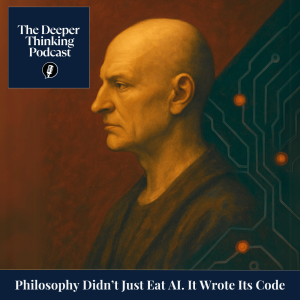
Tuesday May 20, 2025
Tuesday May 20, 2025
Philosophy Didn’t Just Eat AI. It Wrote Its Code — and It’s Hungry for Meaning
An epistemic meditation on artificial intelligence as a philosophical actor—and the urgency of restoring meaning, not just function, to systems that now decide for us.
What does your AI system believe? In this episode, we expand on Michael Schrage and David Kiron’s MIT Sloan thesis, Philosophy Eats AI. We trace how systems built on machine logic inevitably encode assumptions about purpose, knowledge, and reality. This episode reframes AI not as infrastructure—but as worldview. A tool that doesn’t just compute, but commits.
This is a quiet engagement with how leadership itself must evolve. With reflections drawn from Gregory Bateson, Karen Barad, Michel Foucault, and Heinz von Foerster, we introduce the idea of synthetic judgment: the emerging ability to interpret, audit, and question what our systems silently believe on our behalf.
Reflections
Every AI model has a philosophy. Most organizations don’t know what it is.
Leadership now requires ontological fluency—what your systems can and can’t see defines your future.
AI doesn’t just support judgment. It simulates it—often without your permission.
The most dangerous AI systems aren’t wrong. They’re coherent in ways you never intended.
To govern AI well, you need to understand what kind of knowing it performs.
Synthetic judgment isn’t human vs machine. It’s the ability to remain critical inside coordination.
Why Listen?
Learn how AI systems enact hidden worldviews about purpose and value
Explore teleology, epistemology, and ontology as business infrastructure
Understand how synthetic judgment can be cultivated as a leadership skill
Engage with thinkers who saw long ago what AI now makes urgent
Listen On:
YouTube
Spotify
Apple Podcasts
Support This Work
Support future episodes by visiting buymeacoffee.com/thedeeperthinkingpodcast or leaving a review on Apple Podcasts. Thank you.
Bibliography
Barad, Karen. Meeting the Universe Halfway. Duke University Press, 2007.
Bateson, Gregory. Steps to an Ecology of Mind. University of Chicago Press, 2000.
Bostrom, Nick. Superintelligence. Oxford University Press, 2014.
Crawford, Kate. Atlas of AI. Yale University Press, 2021.
Eubanks, Virginia. Automating Inequality. St. Martin’s Press, 2018.
Floridi, Luciano. The Logic of Information. Oxford University Press, 2019.
Foucault, Michel. The Order of Things. Vintage, 1994.
Harari, Yuval Noah. Homo Deus. Harvill Secker, 2016.
Kelleher, John D., and Brendan Tierney. Data Science. MIT Press, 2018.
Marcus, Gary, and Ernest Davis. Rebooting AI. Pantheon, 2019.
Mitchell, Melanie. Artificial Intelligence. Farrar, Straus and Giroux, 2019.
Morozov, Evgeny. To Save Everything, Click Here. PublicAffairs, 2013.
Noble, Safiya Umoja. Algorithms of Oppression. NYU Press, 2018.
Schrage, Michael, and David Kiron. Philosophy Eats AI. MIT Sloan Management Review, 2025.
von Foerster, Heinz. Understanding Understanding. Springer, 2003.
Wolfram, Stephen. “How to Think Computationally About AI.” 2023.
Zuboff, Shoshana. The Age of Surveillance Capitalism. PublicAffairs, 2019.
To design AI is to author a worldview. To lead with it is to be answerable for what it sees—and what it cannot.
#PhilosophyEatsAI #SyntheticJudgment #Ontology #GregoryBateson #MichaelSchrage #David Kiron #KarenBarad #Foucault #vonFoerster #AIethics #MITSMR #Leadership #AIphilosophy #DeeperThinkingPodcast
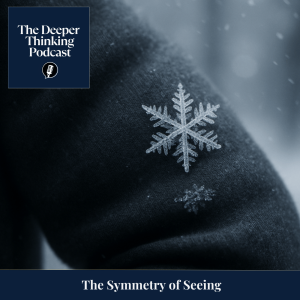
Monday May 19, 2025
Monday May 19, 2025
The Symmetry of Seeing: Kepler, Constraint, and the Shape of Perception
The Deeper Thinking Podcast
For those drawn to quiet forms of understanding, where science becomes metaphor and attention becomes care.
Walking through a snowstorm in 1610, Johannes Kepler forgot the gift he was meant to bring—but noticed the snowflakes. That absence led him to see something else: a structure repeating without exactness, a kind of patterned insistence. This episode explores what symmetry reveals when we look past perfection and toward perception. What if symmetry isn’t just beauty—but memory? Not design, but constraint? And what if the act of noticing itself is a kind of ethical presence?
Drawing from philosophy of science, phenomenology, and the poetics of observation, this episode moves from snowflakes to quantum mechanics, from natural symmetry to psychological inheritance. We reflect on how patterns trap as well as free, and how attention becomes a moral act—especially when we look gently, without trying to solve.
With quiet references to thinkers like Simone Weil, Maurice Merleau-Ponty, and Ilya Prigogine, we explore symmetry not as perfection—but as echo. Not as a solution, but as a way to remain with what repeats. The snowflake melts. The question stays.
Reflections
This episode dwells in the soft space between knowing and seeing. Here are a few thoughts that followed:
Symmetry is not always perfection—it is often the record of restraint.
The mind returns to what it cannot name. That return is a kind of seeing.
Some patterns free us. Some bind. Noticing is what begins to loosen the grip.
The flake doesn’t repeat—but the angle does. Attention works the same way.
Even inherited structures can be held with care when we stop performing and start perceiving.
What falls isn’t always lost. It may just be changing form.
Ethics begins in how we look—not what we know.
And sometimes, the most beautiful insights arrive when we forget the gift and see what’s falling.
Why Listen?
Reimagine symmetry as constraint, not control
Trace how natural form reveals cognitive and emotional structures
Consider perception itself as a moral and aesthetic act
Engage with Weil, Merleau-Ponty, and Prigogine on pattern, perception, and temporality
Listen On:
YouTube
Spotify
Apple Podcasts
Support This Work
If this episode stayed with you and you’d like to support the ongoing work, you can do so gently here: Buy Me a Coffee. Thank you for being part of this slower conversation.
Bibliography
Kepler, Johannes. On the Six-Cornered Snowflake. Trans. Colin Hardie. Oxford: Clarendon Press, 1966.
Weil, Simone. Gravity and Grace. Routledge, 2002.
Merleau-Ponty, Maurice. Phenomenology of Perception. Routledge, 2012.
Prigogine, Ilya. The End of Certainty. Free Press, 1997.
Bibliography Relevance
Johannes Kepler: Introduces the initiating event and foundational metaphor of natural form.
Simone Weil: Reframes attention as an act of ethical precision.
Maurice Merleau-Ponty: Grounds perception as embodied meaning.
Ilya Prigogine: Links pattern emergence with thermodynamic temporality.
Symmetry may begin in nature—but it returns in how we choose to see.
#Kepler #Symmetry #PhilosophyOfScience #Phenomenology #Weil #MerleauPonty #Prigogine #Attention #Perception #TheDeeperThinkingPodcast #PatternRecognition #EthicalSeeing #StructuralBeauty









